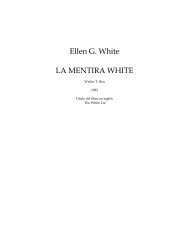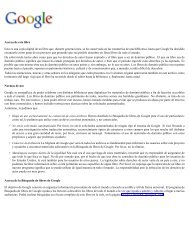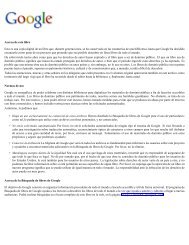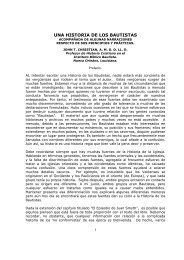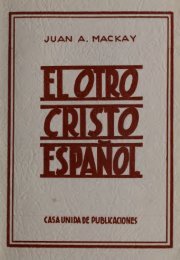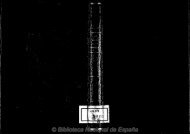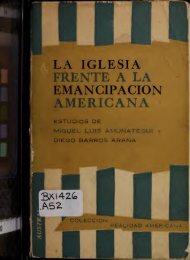- Page 2:
THE LIBRARYOFTHE UNIVERSITYOF CALIF
- Page 6 and 7:
—A.———III.THE C4REAT EXODUS
- Page 8 and 9:
i*RINTED BY R. SANSON,HORSE WYND, N
- Page 10 and 11:
—— ——EVANGELICAL ALLIANCE.C
- Page 12 and 13:
—VI.CONTENTS.CHAPTER III.RISE AND
- Page 14 and 15:
—VIII.CONTENTS.CHAPTER IV,UJNITY
- Page 16 and 17:
—X. CONTENTS.CHAPTER XII.BAPTISM
- Page 18 and 19:
Xll.CONTENTS.CHAPTER XX.FAITH NOT T
- Page 20 and 21:
—XIV.CONTENTS.CHAPTER IV,INFLUENC
- Page 23 and 24:
BOOK I.HISTOKY OF THE PAPACY.CHAPTE
- Page 25 and 26:
MATERIALIZING INFLUENCES. 3nating t
- Page 27 and 28:
TRANSITION FROM THE SYMBOLIC TO THE
- Page 29 and 30:
:THEORY OF HUMAN PROGRESS. 7to lay
- Page 31 and 32:
IDOLATROUS RE-ACTION CONSEQUENT ON
- Page 33 and 34:
1UNION OF FORMER IDOLATRIES IN POPE
- Page 35 and 36:
—THE FALL CONSUMMATED IN POPERY.
- Page 37 and 38:
RISE OF ECCLESIASTICAL SUPREMACY. 1
- Page 39 and 40:
PRESBYTERIAL PARITY BROKEN. 1 *Jmin
- Page 41 and 42:
;CHURCH ASSIMILATED TO THE EMPIRE.
- Page 43 and 44:
'BISHOP, METROPOLITAN, AND PATRIARC
- Page 45 and 46:
CONFORMITY LEADS TO INCORPORATION".
- Page 47 and 48:
—RISE AND GROWTH OP SUPERSTITION.
- Page 49 and 50:
SUPREMACY RECOGNISED BY EDICT. 27Fe
- Page 51 and 52:
POLICY OF THE PONTIFFS. 29the exarc
- Page 53 and 54:
EDICTS OF JUSTINIAN AND PHOCAS. 31w
- Page 55 and 56:
FALL OF THE WESTERN EMPIRE.S3one Bi
- Page 57 and 58:
—CLAIM TO BE G0D''S VICAR. 35Leo.
- Page 59 and 60:
ECCLESIASTICAL SUPREMACY CONSOLIDAT
- Page 61 and 62:
RISE OF THE TEMPORAL SOVEREIGNTY,SO
- Page 63 and 64:
CONVERSION OF THE NORTHERN NATIONS.
- Page 65 and 66:
;GRANTS OF PEPIN AND CIIARLEMAGXE.
- Page 67 and 68:
THE TRIPLE CROWN. 45sions of the Ch
- Page 69 and 70:
SUPERSTITION AND BARBARISM. 47racte
- Page 71 and 72:
RISE OF MONKERY. 49sure sign of emi
- Page 73 and 74:
INTRODUCTION OF IMAGE WORSHIP. 51an
- Page 75 and 76:
ICONOCLAST DISPUTES. 53nn apostate,
- Page 77 and 78:
REAL ORIGIN OF TEMPORAL SUPREMACY.
- Page 79 and 80:
CHRISTIANITY DISPLACED BY PAGANISM,
- Page 81 and 82:
PRINCIPLES OF THE SUrREMACY. 59thel
- Page 83 and 84:
POPES NOMINATE THE EMPERORS. 61in p
- Page 85 and 86:
;FALSE DECRETALS OF ISIDORE. 63had
- Page 87 and 88:
DISORDERS OF THE PAPAL SEE.GoThe pa
- Page 89 and 90:
RISE OF THE GERMAN POWER. 67and ave
- Page 91 and 92:
TEMPORAL JURISDICTION OF BISHOPS.CU
- Page 93 and 94:
ENORMOUS WEALTH OP THE CHURCH, 71ch
- Page 95 and 96:
HILDEBRAND. 73He was theson of a ca
- Page 97 and 98:
WAR OF INVESTITURES. 75primate. It
- Page 99 and 100:
GREGORY VII. AND HENRY IV.77of some
- Page 101 and 102:
IIILDEBRAND S SUCCESSORS. 79Gregory
- Page 103 and 104:
TRIUMPH OF THE MITRE. 81the struggl
- Page 105 and 106:
INNOCENT III. 83The traditions and
- Page 107 and 108:
—GRANDEUR AND DOMINION OF THE POP
- Page 109 and 110:
THE PAPACY AND MILTON's FIEND.S7rob
- Page 111 and 112:
THE WALDENSES AND ALBIGENSES. 89the
- Page 113 and 114:
THEIR NUMBERS AND MANUFACTURING SKI
- Page 115 and 116:
THEIR PERSECUTION. 93any ill-judged
- Page 117 and 118:
TEMPORAL SUPREMACY ARROGATED. 95and
- Page 119 and 120:
—SYLLOGISM OF THE PAPACY. 97poral
- Page 121 and 122:
THE SUPKEilACY NOT ACCIDENTAL. 99in
- Page 123 and 124:
:MONARCHS EXCOMMUNICATED. 101timcnt
- Page 125 and 126:
;THE POPE VERSUS KINGS. 103" For th
- Page 127 and 128:
;ULTRAMONTANISM LOGICAL. 105the tem
- Page 129 and 130:
;bellarmine's theory, or indirect a
- Page 131 and 132:
cosselin's theory or direction. 109
- Page 133 and 134:
—DIRECTION BUT DISGUISED SUPREMAC
- Page 135 and 136:
SPIRITUAL DIRECTION INCLUDES TEMPOR
- Page 137 and 138:
——;THINGS CIVIL AND SACRED BLEN
- Page 139 and 140:
SPANISH CONCORDAT WITH ROME. 117the
- Page 141 and 142:
PAPAL CLAIMS IN GERMANY. 119jurisdi
- Page 143 and 144:
—:;SPIRITUAL DIRECTION IX IRELAND
- Page 145 and 146:
—THE EXTREMES OF THE SUPREMACY. 1
- Page 147 and 148:
OSCILLATIONS OF THE SUPREMACY. 125t
- Page 149 and 150:
;PONTIFICAL RAILWAY TRAIN. 127and s
- Page 151 and 152:
;THE COMPLETE CODE OF THE CHURCH. 1
- Page 153 and 154:
CREATION OP THE CANON LAW. 131stopp
- Page 155 and 156:
PLACES PRIESTS ABOVE KINGS. 133" Th
- Page 157 and 158:
CLERICAL IMMUNITIES. 135bind ; beca
- Page 159 and 160:
—PUNISHMENT OF HERETICS. 137not o
- Page 161 and 162:
;OATH OF BISHOPS. 139Tiohj Roman Ch
- Page 163 and 164:
INCOMPATIBILITY WITH BRITISH LAW. 1
- Page 165 and 166:
BRITAIN UNDER CANON LAW. 143is to t
- Page 167 and 168:
DEVELOPMENT OF CANON LAW. 145forbid
- Page 169 and 170:
—SUPREMACY EXERCISED IN FORMER AG
- Page 171 and 172:
CHURCH CANNOT RENOUNCE TIIEM.HOdecl
- Page 173 and 174:
—CREED OF PAPACY INFALLIBLE. 151w
- Page 175 and 176:
PAPACY STEREOTYPED BY INFALLIBILITY
- Page 177 and 178:
THE PAPACY GROWING WORSE. 155mummy,
- Page 179 and 180:
;ENCYCLICAL LETTER OF PIUS IX. 157t
- Page 181 and 182:
SES OF TEMPORAL SUPREMACY. 159their
- Page 183 and 184:
;CATHOLICISM AND DEMOCRACY. 161that
- Page 185 and 186:
JESUITISM AND RE-ACTION.1G3of the d
- Page 187 and 188:
;DOGJIAS OF THE PAPACY. 165BOOK 11.
- Page 189 and 190:
ORDER AND PLAN STATED. 167parent th
- Page 191 and 192:
DErXII AND INGENUITY OF TOrERY.IGOt
- Page 193 and 194:
POPISH RULE OF FAITH. 171Milner, "
- Page 195 and 196:
AN INFALLIBLE INTERPRETER, 173" he
- Page 197 and 198:
RIGHT OF PRIVATE JUDGMENT. 175place
- Page 199 and 200:
APOSTOLIC MODE. 177of diverse, uncl
- Page 201 and 202:
ABSURDITY OF INFALLIBILITY. 179at l
- Page 203 and 204:
READING THE BIBLE INTERDICTED. 181o
- Page 205 and 206: IRISH PRIESTS AND BIBLE. 183crecs r
- Page 207 and 208: ITALIAN PRIESTS AM) BIBLE. 185sured
- Page 209 and 210: BIBLE UNKNOWN IN ITALY. 187there wa
- Page 211 and 212: —ROME AFRAID OF THE BIBLE. 180whi
- Page 213 and 214: ;UNITY OF THE CHURCH OF ROME. 191CH
- Page 215 and 216: POPISH DEFINITION OF UNITY. 193all.
- Page 217 and 218: DOCTRINAL VARIATIONS OF POPERY. 195
- Page 219 and 220: 7CHARACTER OF ROMISH UNITY.IDthe mo
- Page 221 and 222: CATHOLICITY OF THE CHURCH OF ROME.
- Page 223 and 224: WISAPrROrRIATION OF SCRIPTURE. 201a
- Page 225 and 226: KON-CATIIOLICITY OF DOCTRINE. 203go
- Page 227 and 228: ;NOX-CATIIOLICITY IX TIME. 20-5ques
- Page 229 and 230: ;NON-CATIIOLICITY OF PLACE. 207word
- Page 231 and 232: ;PROMISED CATHOLICITY. 209is univer
- Page 233 and 234: — —bellarmine's argument. 211hi
- Page 235 and 236: ROME^S CORNER-STONE.o2 I" How do yo
- Page 237 and 238: ROMISH IIERMANEUTICS. 215in the pop
- Page 239 and 240: MATTHEW XVI. IS EXAMINKD. 217ject t
- Page 241 and 242: PETERS KEY. 219To make the meaning,
- Page 243 and 244: THE STONE AND THE ROCK. 221of Peter
- Page 245 and 246: THE " TWELVE FOUNDATIONS. 223times
- Page 247 and 248: UNKNOWN TO THE APOSTLES. 225corner.
- Page 249 and 250: UNIVERSAL PASTORATE EXAMINED. 227ca
- Page 251 and 252: NO TRACE OF TRIMACY. 229world and p
- Page 253 and 254: THE PRIMACY AN IMPOSTURE.Solletters
- Page 255: WAS PETER AT ROME? 233Peter had the
- Page 259 and 260: PETER APPOINTED NO SUCCESSOR. 237is
- Page 261 and 262: BREAKS IN THE APOSTOLIC CHAIN. 239W
- Page 263 and 264: ;PROGRESSION A UNIVERSAL LAW. 241CH
- Page 265 and 266: CLAIM OP INFALLIBILITY. 243fallible
- Page 267 and 268: INFALLIBILITY VERSUS REVELATION. 24
- Page 269 and 270: POPISH CIRCLE. 247fallibility of th
- Page 271 and 272: INFALLIBILITY VERSUS REASON. 2-i9ma
- Page 273 and 274: VARIATIONS RESPECTING INFALLIBILITY
- Page 275 and 276: ;SEAT OF INFALLIBILITY WIIERE! 253l
- Page 277 and 278: POPES INFALLIBLE L\ CATHEDRA. 255ni
- Page 279 and 280: ;THE SEVEN TESTS. 257knowing, and w
- Page 281 and 282: DIFFICULTIES OF THE INFALLIBILITY.2
- Page 283 and 284: —THE BULLARIUM. £G1its many hund
- Page 285 and 286: KO SALTATION OUT OF THE CHURCH OF R
- Page 287 and 288: —ANNUAL EXCOMMUNICATION OF PROTES
- Page 289 and 290: EXCLUSIVE SALVATION TAUGHT AT ROME.
- Page 291 and 292: INVINCIBLE IGNORANCE, 269said it (f
- Page 293 and 294: —OF ORIGINAL SIN. 271CHAPTER IX.O
- Page 295 and 296: —DECREE OF TRENT. 273piscence dwe
- Page 297 and 298: POPISH DOCTRINE OF THE FALL.27oM. P
- Page 299 and 300: POPISH DOCTRINE OF GRACE. 277of fee
- Page 301 and 302: STATE OF rURE NATURE. 279and has ac
- Page 303 and 304: THE FALL VIRTUALLY DENIED. 281neces
- Page 305 and 306: IMMACULATE CONCEPTION OF MARY. 283n
- Page 307 and 308:
;OPUS OPERATUM. 285Thus have we com
- Page 309 and 310:
;SALVATION OF GOD. 287destroy, not
- Page 311 and 312:
SALVATION OF MAN. 289proceed to sta
- Page 313 and 314:
PROTESTANT AND POPISH JUSTIFICATION
- Page 315 and 316:
—ASSURANCE CONDEMNED. 293sion of
- Page 317 and 318:
—THE SEVEN SACRAMENTS. 295attempt
- Page 319 and 320:
INTENTION OF THE PRIEST. 297the sou
- Page 321 and 322:
INTOLERANCE OF ROMANISM, 299tics an
- Page 323 and 324:
ESSENTIAL TO SALVATION. 801true fai
- Page 325 and 326:
POPERY SIMPLE MAGIC. 303Rome has a
- Page 327 and 328:
;;;EXORCISM OF WATER.SOowax candles
- Page 329 and 330:
THE EUCHARIST, TRANSUBSTANTIATION,
- Page 331 and 332:
RISE OF TRANSUBSTANTIATION. 309circ
- Page 333 and 334:
ABSURDITY OP THE DOGMA. 311this cha
- Page 335 and 336:
—TRANSUBSTANTIATION UNSCRIPTURAL.
- Page 337 and 338:
;IXCOMPREHENSIBLE BY REASON. 315sel
- Page 339 and 340:
OPPOSED TO THE SENSES. 31 7the fait
- Page 341 and 342:
GROSS IDOLATRY OF MASS.ol.9decree g
- Page 343 and 344:
THE MASS A SACRIFICE. 321a disposit
- Page 345 and 346:
THE CUP WITHHELD. 323is only one pr
- Page 347 and 348:
OF PENANCE AND CONFESSION. 325CHAPT
- Page 349 and 350:
CONTRITION AND ATTRITION.S27God ;an
- Page 351 and 352:
ATROCITIES OP THE C0>;FESSI0NAL.S29
- Page 353 and 354:
;IMPIETY OF THE CONFESSIOXAL. 331le
- Page 355 and 356:
OF INDULGENCES.S33CHAPTER XV.OF IND
- Page 357 and 358:
;THEORY OF INDULGENCES.S35plain opp
- Page 359 and 360:
—SALE OF INDULGENCES.C,o7power we
- Page 361 and 362:
POWER OF INDULGENCES.S39are avarici
- Page 363 and 364:
APOSTOLIC TARIFF. 341So lucrcative
- Page 365 and 366:
LICENSE TO SIN. 343isms were immacu
- Page 367 and 368:
PAPAL CALIFORNIA. 345Roman Catholic
- Page 369 and 370:
OF PURGATORY. 347CHAPTER XVI.OF PUR
- Page 371 and 372:
The existence of purgatory isPROOF
- Page 373 and 374:
CONDEMNED BY SCRIPTURE. 551VirgiPs
- Page 375 and 376:
DOCTRINE OF INTENTION. 353was told
- Page 377 and 378:
OF THE WORSHIP OF IMAGES. 355CHAPTE
- Page 379 and 380:
IMAGE-WORSHIP REVIVED PAGANISM. 857
- Page 381 and 382:
IDOLATRY OF THE PRACTICE.S'.Oof E,o
- Page 383 and 384:
OF THE WORSHIPPING OF SAIiNTS. 361C
- Page 385 and 386:
;DULIA AND LATRIA.SG3upon the minds
- Page 387 and 388:
PRACTICE IDOLATROUS.SG5says, receiv
- Page 389 and 390:
ABSURDITY OF SAINT-WORSHIP.3G7They
- Page 391 and 392:
WISH FOR A MAN-GOD. 369systems of i
- Page 393 and 394:
—MARY AND THE PSALTER. 371In 1832
- Page 395 and 396:
REDEMPTION ASCRIBED TO MARY. 373Jos
- Page 397 and 398:
MARY THE SAVIOUR. 375mour, " I aske
- Page 399 and 400:
THE TWO LADDERS. 377but has been ex
- Page 401 and 402:
ENORMITY OF DOCTRINE. 379publicly t
- Page 403 and 404:
—TAUGHT BY COUNCILS AND DOCTORS.
- Page 405 and 406:
PRACTICE OF ROMAN CHURCH.S83taiitls
- Page 407 and 408:
STRUGGLES IN POLAND. 385greatness o
- Page 409 and 410:
;STRUGGLES IN FRANCE.S87appendages
- Page 411 and 412:
—;:REVOCATION OF NANTES' EDICT.S8
- Page 413 and 414:
RETRIBUTION ON FRANCE. 391blood unr
- Page 415 and 416:
JESUITICAL DISCLAIMERS.S93and i6her
- Page 417 and 418:
GENIUS OF THE PAPACY. S9;BOOK III.G
- Page 419 and 420:
POPERY AND PAPACY DISTINGUISHED. SO
- Page 421 and 422:
;REAL AUTHOR OF PAPACY. 399velopmen
- Page 423 and 424:
:KEY TO THE PAPACY. 401wise, and th
- Page 425 and 426:
POPERY A COUNTERFEIT. 403fleet his
- Page 427 and 428:
POPERY AS OF MAN. 405Thus the count
- Page 429 and 430:
CHOICE OF A SEAT. 407feet all other
- Page 431 and 432:
LOWERS GOD AND EXALTS THE PRIEST. 4
- Page 433 and 434:
LEANS ON HUMAN GOVERNMENT. 411Seven
- Page 435 and 436:
LEANS ON HUMAN PASSIONS. 413rather
- Page 437 and 438:
EXTRAORDINARY COMBINATION OF QUALIT
- Page 439 and 440:
INFLUENCE OF POPERY ON THE INDIVIDU
- Page 441 and 442:
INTELLECTUAL RANK OF NATIONS. 419re
- Page 443 and 444:
QUICKENL\G POWER OF CHRISTIANITY. 4
- Page 445 and 446:
—;rOPERY DESTROYS ACTIVITY AND IN
- Page 447 and 448:
POPERY DESTROYS SELF-RELTAXCE. 425c
- Page 449 and 450:
INFLUENCE OF POPERY ON GOVERNMENT.
- Page 451 and 452:
aTHE TWO LIBERTIES. 429each being i
- Page 453 and 454:
DESPOTISM OF PAPAL GOVERNMENT. 431t
- Page 455 and 456:
THE MINOR PAPACIES. 433right,—acc
- Page 457 and 458:
;REVIVAL OP BARBARISM. 435Papacy wa
- Page 459 and 460:
PAPAL RELICS AND PROTESTANT SCIENCE
- Page 461 and 462:
PAPAL ESPIONAGE. 489and in all coun
- Page 463 and 464:
THE SAXCTTFIED DAGGER. 441priests w
- Page 465 and 466:
the constitutedTHE " "WOMAN DRUNKEN
- Page 467 and 468:
PAST CRUSADES AND MODERN REVOLUTION
- Page 469 and 470:
ST DOMINIC AND THE INQUISITION. 447
- Page 471 and 472:
SPAIN FALLS BEFORE THE IXQUISITION.
- Page 473 and 474:
—CASTLE OF CIIILLON. 451—the li
- Page 475 and 476:
ENORMITY OF THE INQUISITION. 453the
- Page 477 and 478:
CONSTITUTIONALISM SPRINGS FROM CHRI
- Page 479 and 480:
;PROBABILISM AND INTENTION. 457Weis
- Page 481 and 482:
FREQUENCY OF PERJURY.4o0Howin the r
- Page 483 and 484:
;ASSASSINATION AND CONCUBINAGE.4G1h
- Page 485 and 486:
—THE CONFESSIONAL.4G3ciety throug
- Page 487 and 488:
NO SABBATH IN POPISH COUNTRIES. 465
- Page 489 and 490:
A SABBATH IN COLOOXR. 467own countr
- Page 491 and 492:
POPISH WORSHIP GENERATES GLOOM. 469
- Page 493 and 494:
THE SABBATH IN FRANCE. 471from any
- Page 495 and 496:
—POPEDOM A MORAL WRECK. 473Contin
- Page 497 and 498:
——VERDICT OF HISTORY.47oa caree
- Page 499 and 500:
BELGIUM AND HOLLAND. 477ticate our
- Page 501 and 502:
:celebrated stream.POPISH AND PROTE
- Page 503 and 504:
PROTESTANT AND POPISH CANTONS, 481v
- Page 505 and 506:
DECADENCE OF FRANCE. 483beauty, and
- Page 507 and 508:
—;DISORGANIZATION OF SPAIN. 485ti
- Page 509 and 510:
DEGRADATION OF ITALY. 487chants and
- Page 511 and 512:
IRELAND. 489lars,—a sum disasti'o
- Page 513 and 514:
SCOTLAND AND ITALY CONTRASTED. 491h
- Page 515 and 516:
GRANDEUR OF BRITAIN. 493US in wealt
- Page 517 and 518:
SUAM REFORM AND REAL RE-ACTION. 495
- Page 519 and 520:
INHERENT WEAKNESS OF POPERY. 4.97Po
- Page 521 and 522:
THE SHAM REFORM DEFEATED. 499of rel
- Page 523 and 524:
;COMPACT BETWEEN JESUITISM AND ABSO
- Page 525 and 526:
JESUIT WAR AGAINST EDUCATION. 503ga
- Page 527 and 528:
NEW SCHOOL-BOOKS. 505penalty of for
- Page 529 and 530:
NEW MIRACLES. 507Pope returned to R
- Page 531 and 532:
—THE UPPER CLASSES AND ROMANISM.
- Page 533 and 534:
SIMULTANEOUS CRUSADE AGAINST LIBERT
- Page 535 and 536:
;THE GALLEYS OP NAPLES, 513the dogm
- Page 537 and 538:
CONCORDAT VTITH TUSCANY. 515mities
- Page 539 and 540:
JESUIT TACTICS IN AUSTRIA. 5 1 7abr
- Page 541 and 542:
AGGRESSION ON BRITAIN. 519Nor is it
- Page 543 and 544:
ANTI-PROTESTANT CRUSADE PREACHED, 5
- Page 545 and 546:
MISSIONS TO SEMI-BARBAROUS REGIONS.
- Page 547 and 548:
MISSIONS TO SOUTH AND EAST. 525quar
- Page 549 and 550:
}—;JESUIT OPERATIONS IN ENGLAND.
- Page 551 and 552:
JESUIT OPERATIONS IN SCOTLAND. 529N
- Page 553 and 554:
ROMANIST CLUBS. 531than the ordinar
- Page 555 and 556:
MALTA AND AUSTRALIA. 533Church." Ac
- Page 557 and 558:
ROME IN THE PACIFIC. 535inspected b
- Page 559 and 560:
;POPERY THE MOTHER OF REVOLUTIONS.
- Page 561 and 562:
EVANGELISTIC AGENCIES IN GERMANY AN
- Page 563 and 564:
—BOITEMIAN AND WALDENSIAN CHURCHE
- Page 565 and 566:
PROTESTANTISM IN ITALY. 543chase of
- Page 567 and 568:
DANGER OF A RECOIL. 54:5side ; it h
- Page 569 and 570:
A BLOW AT ROME. 547as experience ha
- Page 571 and 572:
THE BIBLE IN ROME. 549convey them a
- Page 573 and 574:
!CREATION GROANING. 551of God for I
- Page 575 and 576:
APPENDIX.BRITAIN—:MAYN00TH—UNIV
- Page 577 and 578:
—APPENDIX. 555—liis ni-hts as a
- Page 579 and 580:
APPENDIX. 557GENERAL STATEMENT OF T
- Page 581:
——————Lately piiblislio
- Page 585:
j ^^58 00597 4265UC SOUTHERN !;lACI



